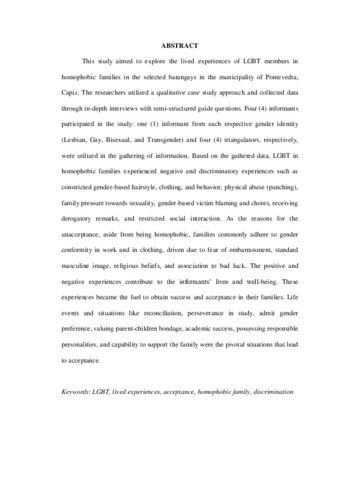LGBT members’ lived experiences in homophobic families
| dc.contributor.advisor | Bañas, Michael A. | |
| dc.contributor.author | Daradar, Steven B. | |
| dc.contributor.author | Apitong, Lovelyn D. | |
| dc.contributor.author | Catalan, Andrian B. | |
| dc.date.accessioned | 2024-04-26T08:28:14Z | |
| dc.date.available | 2024-04-26T08:28:14Z | |
| dc.date.issued | 2023-07 | |
| dc.identifier.citation | Daradar, S.B., Apitong, L.D., & Catalan, A.B. (2023). LGBT members’ lived experiences in homophobic families [Undergraduate thesis, Capiz State University Pontevedra Campus]. CAPSU Institutional Repository. | en |
| dc.identifier.uri | https://repository.capsu.edu.ph/handle/123456789/608 | |
| dc.description | Abstract only | en |
| dc.description.abstract | This study aimed to explore the lived experiences of LGBT members in homophobic families in the selected barangays in the municipality of Pontevedra, Capiz. The researchers utilized a qualitative case study approach and collected data through in-depth interviews with semi-structured guide questions. Four (4) informants participated in the study: one (1) informant from each respective gender identity (Lesbian, Gay, Bisexual, and Transgender) and four (4) triangulators, respectively, were utilized in the gathering of information. Based on the gathered data, LGBT in homophobic families experienced negative and discriminatory experiences such as constricted gender-based hairstyle, clothing, and behavior, physical abuse (punching), family pressure towards sexuality, gender-based victim blaming and chores, receiving derogatory remarks, and restricted social interaction. As the reasons for the unacceptance, aside from being homophobic, families commonly adhere to gender conformity in work and in clothing, driven due to fear of embarrassment, standard masculine image, religious beliefs, and association to bad luck. The positive and negative experiences contribute to the informants’ lives and well-being. These experiences became the fuel to obtain success and acceptance in their families. Life events and situations like reconciliation, perseverance in study, admit gender preference, valuing parent-children bondage, academic success, possessing responsible personalities, and capability to support the family were the pivotal situations that lead to acceptance. | en |
| dc.language.iso | en | en |
| dc.publisher | Pontevedra Campus, Capiz State University | en |
| dc.subject | LGBT | en |
| dc.subject | Lived experiences | en |
| dc.subject | Acceptance | en |
| dc.subject | Homophobic family | en |
| dc.subject | Discrimination | en |
| dc.title | LGBT members’ lived experiences in homophobic families | en |
| dc.type | Thesis | en |
| thesis.degree.discipline | Social Studies | en |
| thesis.degree.grantor | Capiz State University Pontevedra Campus | en |
| thesis.degree.level | Undergraduate | en |
| thesis.degree.name | Bachelor of Secondary Education | en |
| thesis.degree.department | College of Education, Arts and Sciences | en |

